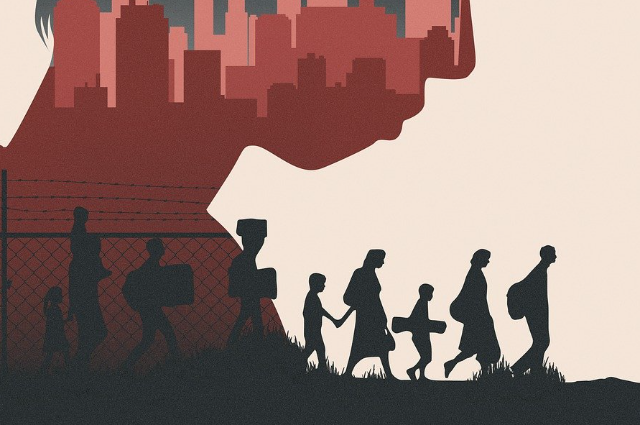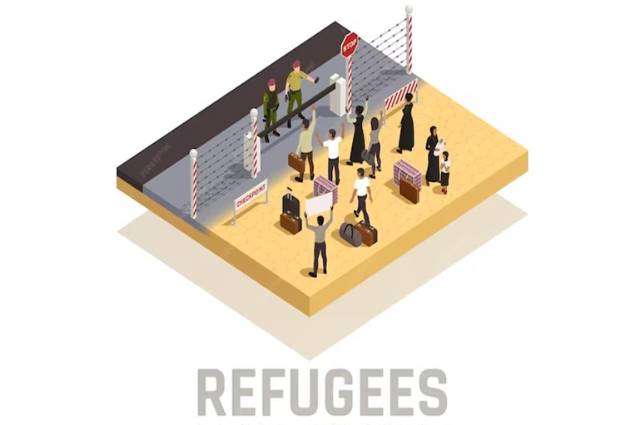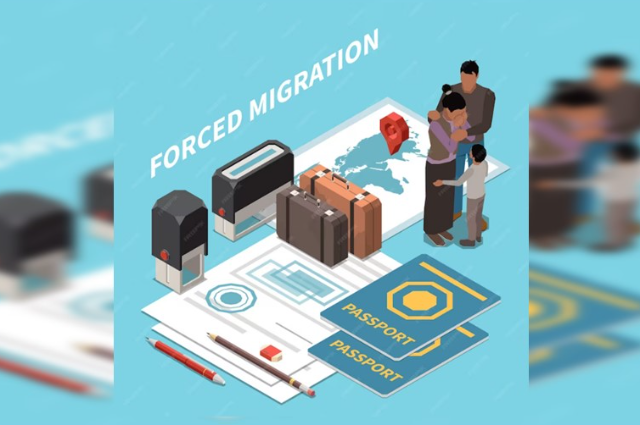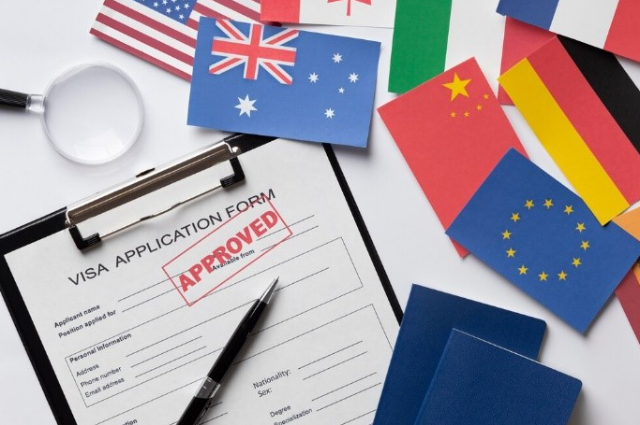
Image by Víctor Mendoza from Pixabay
Introduction
The illegal immigration of some agents that claim to settle some citizens for better opportunities has been cases that are seen in India. Despite efforts to establish additional legal routes between India and Europe, a considerable number of individuals resort to such unauthorised third-party agents to manipulate the system. One strategy for somehow reaching foreign countries is the use of "donkey flights", where Indian migrants secure tourist visas for Schengen-zone countries to exploit immigration loopholes and illegally enter the United Kingdom through alternative European routes. The lack of transparency surrounding this mode of operation has resulted in limited knowledge regarding its scale and organisational structure within the Indian illegal immigration business.
European nations are already facing difficulty with an unprecedented surge in illegal immigrants from India. While accurately measuring the numbers of Indian nationals in Europe proves challenging. Insights are different from various sources including estimates from individual countries, asylum application records and deportation statistics.
Different Countries' statistics for Indian migrants
In Italy for instance, unauthorised Indian migrants constituted around 30 percent of the estimated Indian population of 170,000 in 2012. In Germany, several thousand Indian migrants are present and the Netherlands reports estimates ranging from 3,000 to 4,000. As for asylum applications, Indian nationals submitted 2,785 to the European Union (EU) in 2011, often as a tactic to evade immediate deportation.
The United Kingdom stands out with the highest number of illegally residing Indians. Robust estimates by the UK Home Office place the population between 430,000 and 618,000 though actual figures may vary significantly. In 2010; 7,135 Indian nationals were deported from the United Kingdom. In terms of legal migration, Indians constitute the largest non-European Union migrant group in the United Kingdom, surpassing other major contributors such as Nigeria, Pakistan, China, and Bangladesh.
What's exactly a Donkey flight?
Indian immigrants commonly label a well-known pathway to the United Kingdom as "donkey flights," a term derived from a Punjabi idiom signifying the act of moving from one place to another. This strategy involves applicants seeking a tourist visa for a Schengen country within the European Union. The granted visa provides the flexibility to navigate freely within Europe's border-free zone, strategically employed with the aim of "leapfrogging" into the United Kingdom.
Illegal migration from India is arranged by well-financed illegal immigration networks that employ innovative tactics to take advantage of every available gap in existing policies and visa frameworks. Within India's Punjab region, numerous young individuals annually evade immigration checks to journey to Europe, utilizing strategies devised by various illegal and non-registered agencies known as visa "agents." These unethical middlemen exploit aspiring economic migrants, driven by a pursuit of rapid financial gains.
How the 'Donkey Route' Operates?
1) Commencement of the First round of travel
Embarking on the 'Donkey Route' commences with arriving in a Latin American nation, typically Ecuador, Bolivia, Guyana, Brazil, or Venezuela. These countries serve as crucial transit points due to lenient visa regulations for Indians. The initial selection establishes the foundation for subsequent steps in the complex course of the 'Donkey Route.'
2) Traversing Panama's Wilderness
Navigating the dangerous Darien Gap in Panama becomes a pivotal phase in the 'Donkey Passage.' Challenges encompass rugged terrain, limited resources and potential encounters with criminals. The risks associated with crossing Panama's jungle underscore the unfavourable conditions encountered by those navigating the 'donkey route.'
3) Infiltrating Mexico
Mexico assumes a significant role in the 'Donkey Route,' functioning as a diversion point where migrants must evade government scrutiny. The expansive border separating the US and Mexico poses a challenging obstacle by prompting migrants to employ diverse methods such as crossing the Rio Grande to approach their desired destination.
4) Obstacles at the US Border
Upon reaching the US border, individuals on the 'Donkey Route' confront additional hurdles. The fortified border necessitates inventive strategies to circumvent surveillance leading to instances of burrowing, scaling fences, or leveraging technology to outsmart border patrol. Grasping the challenges at the US border provides insights into the details of the 'Donkey Route.'
Reason for Migrants preferring Donkey routes
Punjab which is India's most populous state is predominantly agricultural. In 2007, daily labourers typically earned between 73 and 95 rupees per day (approximately $2). For the educated starting salaries in offices were around $250 per month. Despite this, high unemployment prevails, with over 90 per cent of Indian workers engaged in the informal sector. Official government unemployment figures (3.8 percent for the country and 1.8 percent for Punjab in 2012) may not fully represent the situation. The Times of India reported in 2012 that 30 million of India's labour force is unemployed, 26 million are officially underemployed, 40 million seek additional work, and 35 million explore alternative livelihoods.
While Punjab assertions are that they have a relatively low unemployment rate in India unhappiness among middle-class families still prevails. In 2013, unemployed youth staged protests for jobs and some jobless men even held a 35-day hunger strike and there were cases of suicide that were related to unemployment.
On the other hand, migrants anticipate substantially higher earnings and better opportunities in the United Kingdom. The appeal of increased prestige within the local community accompanies the prospect of working abroad for individuals across various societal sectors. Some are moved by nervousness as described by Surinder Kumar Kalia, a former Additional Deputy Commissioner of Police in Ludhiana stating that those not from good financial background who are seeking to go abroad will consult agents to fulfil their aspirations with numerous individuals involved in this business.
The compelling drive to seek prosperity abroad is deeply found in the "Doaba" belt of Punjab, a region that serves as the origin for many Indians already established in the United Kingdom. Here having a relative working abroad is a matter of significant honour. Rakesh Kumar Jaiswal, Senior Superintendent of Police in Jalandhar, notes that numerous fraudsters exploit the prevalent enthusiasm among young individuals to relocate. The attraction of settling abroad is appealing for the youth but lacking knowledge about the visa procedures, they often fall into a harmful cycle by travel agents.
Case study of a truck driver who went through Donkey route
A truck driver from Punjab as he considers another attempt at emigration, shares his experience of illegally entering the United Kingdom in 2001 and being deported in 2008. The 39-year-old father initially travelled to Austria on a Schengen visa obtained through a local travel agency in exchange for a large payment. Upon reaching Austria, he secretly boarded a train to France, securing himself in a small cabin to evade detection. Subsequently reaching a key location for travel agents with dual roles, he encountered an English couple in their thirties. His uncle in Southall had paid them GBP 1,800 to facilitate his return to the United Kingdom in their car.
Recalling the journey, he recounts being covered in the car's trunk, indulging in Famous Grouse whisky provided by the couple, and waking up in England. His primary motivation for undertaking this risky journey was the prospect of a better life and significantly higher earnings by emphasizing a twentyfold increase compared to his potential income in India. In one construction company he worked for; he observed that only two out of 16 labourers possessed legal documentation—a scenario he claims to be widespread across the United Kingdom, with many unregistered individuals.
His final employment in a shoe-making factory eventually led to authorities apprehending him. Surprisingly, he views the subsequent jail time as a form of luxury highlighting the provided meals, including chicken, and the opportunity to craft their liquor.
CID Report on Dunki Flights taken up by Gujarat Passengers
Sixty-six individuals from Gujarat who were passengers on the plane bound for Nicaragua faced a return from France due to human trafficking suspicions. According to officials from the state Crime Investigation Department (CID), these passengers had allegedly agreed to pay immigration agents Rs 60-80 lakh for illegal assistance in crossing into the US. The Dubai to Nicaragua flight, carrying a total of 303 passengers, was stopped at France's airport on December 21 for questioning regarding human trafficking concerns. Subsequently, the flight was permitted to continue eventually landing in Mumbai on December 26.
Out of the original 303 passengers, only 276 returned to Mumbai, as 27 individuals, including two minors, expressed their intention to seek asylum in France. Superintendent of Police, CID - Crime and Railways, Sanjay Kharat, who is leading the investigation stated that the 66 individuals from Gujarat including minors were primarily from Mehsana, Ahmedabad, Gandhinagar, and other districts.
It was revealed that 55 of them have been questioned and their statements were even recorded. Most of them had educational backgrounds from classes 8th to 12th. Each person admitted to agreeing to pay local immigration agents Rs 60 lakh to Rs 80 lakh for assistance in illegally crossing into the US, starting their journey in Nicaragua through Dubai.
The investigation has also obtained names and contact details of around 15 agents who promised to facilitate the illegal entry of these 55 individuals into the US through the US-Mexico border. According to Kharat, the agents assured the Gujarat natives that the payment would only be required upon reaching the US.
Furthermore, the agents conveyed that their personnel would guide the passengers from Nicaragua to the US border, assisting in the crossing. It was disclosed that the agents had also booked air tickets for the passengers and provided USD 1,000 to 3,000 (approximately Rs 83,300 to Rs 2.5 lakh) to each passenger for handling potential emergency situations.
Following the agents' instructions, the 66 passengers arrived in Dubai from Ahmedabad, Mumbai, and Delhi between December 10 and 20; ultimately boarding the Nicaragua-bound aircraft, as outlined in the CID release.
The CID has formally communicated with the Central Bureau of Investigation (CBI), seeking assistance in gathering additional information regarding the agents involved in obtaining Dubai visas for the 55 passengers. The CID is specifically interested in details such as the bank information of agents who paid the visa fees from their accounts, the process by which agents secured visas for Nicaragua from Dubai, and the individuals or entities responsible for booking the Dubai flights and funding the passengers' tickets.
In addition, the text highlights Nicaragua's emerging status as a sought-after destination for those seeking asylum in the US. Flights to Nicaragua or third-world countries with easily obtainable travel documents are commonly referred to as 'dunki' flights.
Providing context, data from the US Customs and Border Patrol (CBP) indicates that in the financial year 2023, 96,917 Indians attempted to enter the US illegally. Notably, at least 41,770 of these attempts involved individuals trying to enter the US through the Mexican land border.
Money demanded from migrants for illegal route
The journalist informed the agent that his 23-year-old brother, possessing only a school-leaving certificate, aimed to secretly reach the United Kingdom through a container ship departing from Mumbai. The agent dismissed the outdated tactic of container ship travel emphasising that current methods primarily require financial resources. He proposed an alternative: for a sum between 8 to 9 lakhs (approximately $16,700 to $18,800 USD at the time), the brother could go to a Schengen country. However, the agent asserted that for direct entry into England, a payment of 12 lakh rupees (about $25,000) was necessary, dependent upon reviewing the passport. Cautioning against opting for a cheaper deal the agent highlighted the risks, stating that a lower payment might result in the person being stranded in a container, potentially in Russia, necessitating rescue efforts. Another customer in the shop resounded this sentiment, suggesting it's more worthwhile to take the risk from France or Belgium than sitting in a container from Bombay.
Agents making grand promises but they were all fake
The Underground Life Case delves into instances where agents make grand promises to victims, only for these assurances to be crushed upon reaching the destination country. These agents deceive the public by marketing dreams of smooth migration, a perfect life, and wealth accumulation abroad. Both parties willingly engage in illegal activities, disregarding potential consequences. In numerous criminal cases, victims suffer severe repercussions, losing their entire identity along with crucial documents like passports. Only a fortunate few among the migrants receive support from their community in the host country. The narrative of Rajwinder Singh ( anonymous name subject changed) presently residing in Dubai as an illegal immigrant serves as a distressing illustration highlighting the complexities of such situations.
In 2011, Rajwinder embarked on a journey from Delhi to Dubai, fulfilling a financial commitment to someone at Delhi airport. Upon reaching Dubai, a local individual received him and transported him to a residence. The homeowner engaged Rajwinder in a conversation about his life in India. Subsequently, he assigned Rajwinder tasks related to cleaning and kitchen work, seizing his passport and offering a meagre monthly salary of Rs. 12,000 in Indian currency.
After five months, Rajwinder realized the harsh reality of his situation. He endured miserable living conditions in an underground room, lacking a proper blanket and receiving only a minimal amount of food. Two years later, he managed to retrieve his passport and left the exploitative household. Seeking refuge with another group of Punjabi immigrants, they provided assistance, enabling him to secure a position in a Dubai-based security firm with a monthly salary of Rs. 25,000.
Although Rajwinder sent money to his family through a friend, he hasn't been able to reunite with them in India. Despite the family clearing their debts, they anxiously await the return of their son.
- Malwinder Singh’s story: The perils of relocating to different countries
Malwinder Singh's ( Name subject to change and anonymous identity ) story sheds light on the challenges he faced upon reaching his destination country. Initially, Malwinder obtained a fake visa, a fact he discovered only after arriving in Dubai. Upon his arrival, he entered into a two-year job contract and was summoned to Chandigarh, where he joined a group of 15 individuals also bound for Dubai. In early 2013, they collectively flew from Delhi to Dubai, where they were received by a local contact who distributed them to different locations.
Upon reaching Dubai, Malwinder encountered an individual from Patiala in his company. However, after 15 days, they were relocated to an office where their responsibilities involved cleaning bathrooms, and their freedom of movement was severely restricted. Additionally, their passports were confiscated. In this new setting, they found themselves working approximately 16 hours a day, receiving just a monthly salary of Rs. 12,000. Communication with their families was denied which added to the harsh conditions they faced.
Subsequently, they discovered that they had been shifted to a new company now under different employers than initially expected. This unforeseen situation proved to be unimaginable for Malwinder, far from what he had anticipated in life. After a considerable period, he encountered an Indian Punjabi individual working on visa matters to whom he narrated his distressing story seeking assistance.
Eventually, Malwinder managed to escape from the restrictive environment. Seizing an opportunity, he escaped away from the office and sought refuge at the Indian embassy. Taking advantage of an amnesty program, he returned to India in early 2015, putting an end to his challenging ordeal in the foreign country.
Student Visas are another route for Donkey flights
Student visas are a popular option for young individuals looking to relocate and work in foreign countries. In recent times, a prevalent fraudulent scheme involves the creation of fake bank accounts to give the misapprehension of meeting the financial requirements necessary for obtaining a visa. According to senior local police sources, a significant number of individuals from the Punjab region make it to the United Kingdom annually on student visas, with many having the primary intent of finding employment.
Numerous freelance agents in Punjab, claiming to be immigration experts have assisted young Indians in entering the United Kingdom through falsely obtained student visas. The scam exploits a gap in the UK's screening system for foreign students where immigration authorities struggle to ascertain the legitimacy of an applicant's financial means. Punjabi agents openly admit to deceiving authorities, revealing their method of temporarily depositing a lump sum [ranging from GBP ( Pounds) 10,500 to 16,000] into a forthcoming student's bank account during the 28-day visa processing period. The borrowed money is inaccessible to the visa recipient and the agent withdraws it after the visa is issued.
Evidence of this widespread abuse was uncovered by reporters from the Sunday Times, who used a hidden camera to expose visa agents offering temporary loans to fake students. Journalists, posing as potential immigrants seeking employment approached five randomly selected visa agents in different Punjabi towns. All agents assured them that temporary funds to bypass visa rules could be easily arranged with the borrowed sum removed after the visa was granted. Some agents even offered package deals, charging processing fees of around GBP 200 ($300) for application documents and 7 to 10 percent interest rates for organizing the "money for show."
Criminal lawyer Vikram Choudhri, representing the Chief Minister of Punjab, acknowledged the state government's efforts to combat immigration scams particularly the misuse of student visas. Choudhri mentioned that a considerable number of students go to the UK each year with the primary goal of working and settling there emphasizing that only a few attend reputed universities while most opt for smaller colleges.
Jalandhar, a bustling city is identified as an infamous centre for immigrants seeking an easy route abroad housing some office blocks referred to as "visa factories." Academic Overseas Educational Consultants (AOEC), a relatively well-established institution in the city was found to be involved in facilitating such schemes. AOEC's admission manager Trikha informed a reporter that he would need to show over GBP 8,000 ($12,000) in his bank account to apply for a student visa. When the reporter expressed a lack of funds, Trikha acknowledged this common problem and offered to arrange funds with a seven percent interest charge.
AOEC's billboards in Jalandhar advertised UK student visas for GBP 1,975 ($2,961). Trikha clarified that this offer was only valid for the January intake, but a GBP 6,000 ($9,000) package could guarantee the reporter a place at a British college in the United Kingdom by March. Trikha explained that courses would be available at various institutions, such as the College of IT and E-Commerce (CITEC) in London, Spinnaker College in Portsmouth, and South Lanarkshire College in Scotland. She mentioned that choosing the Scottish institution would allow the reporter to opt for one year of study followed by a two-year work visa emphasising that the main goal should be to work as students are permitted to work four hours a day.
Legal routes exploitation
The risks linked with being smuggled into the United Kingdom prompt many immigrants to choose relatively safer alternatives, such as participating in sham marriages or assuming roles within tourist groups or dance troupes.
Operational under the guise of a fake tour or dance group, this method relies on the notion that given the large entry of Indians into the United Kingdom (amounting to 880,000 in 2012), there lacks the technological and human resources to ensure that all individuals depart when their visas expire. According to sources within the Punjabi police, immigrants frequently pretend to be involved in a singing or dance troupe supposedly heading to the United Kingdom for a religious ceremony or wedding. Although the troupe initially enters the country legally on tourist visas, a few of the purported "dancers" deliberately do not return home, exploiting the limitations in monitoring their departure.
Fake marriage routes for entering in United kingdom
In Ludhiana, a local businessman in his 20s, preferring to remain anonymous, disclosed that his cousin utilized the "cultural program" route to Europe, specifically Germany. His cousin participated in a supposed cultural program, lasting nine months until apprehended by local police. He emphasized that actual dance skills were unnecessary; participants merely had to follow the lead dancer in the troupe.
An alternative avenue involves obtaining a spousal visa. In Ludhiana, an agent named Mr. Singh claimed expertise in quickly arranging fake weddings. Specializing in student visas and arranging marriages for individuals seeking a spouse visa through a student connection, he asserted his ability to organize a wedding, complete with a spouse, venue, and traditional ceremony within an hour. Mr. Singh, with 2,500 contacts on his phones said that by facilitating 30 students and their spouses' journeys to the United Kingdom in November 2010. He acknowledged that some marriages might be fake with the couples likely parting ways upon arrival.
Fake marriages present a relatively successful method of entering the United Kingdom, acknowledged by immigration officials as challenging to detect. This difficulty is aggravated by Indian cultural norms, where it is considered normal for a husband and wife to meet for the first time on their wedding day.
Conclusion
A considerable portion of the Indian population numbering in the hundreds of millions has seen limited advantages from India's widely acclaimed economic growth. Even the most powerful barriers are insufficient to balance the appeal of potential financial gains for families residing below or close to the poverty line. Despite the inherent dangers associated with engaging criminal networks for illegal migration abroad, a significant number of individuals believe that the potential benefits outweigh the risks. For those already living in poverty, then the perceived rewards on the other hand will make such risks seem worthwhile.
Prospective immigrants find inspiration in the accomplishments of those who successfully reach foreign lands. These accomplished migrants not only achieve earnings far beyond what they could envision in a lifetime in India but also garner significant importance within their local communities. This deeply ingrained mindset poses a challenge to alter. Historical practices such as risking lives by hiding in containers on ships from Mumbai to Europe, may have evolved in terms of routes, but the underlying aspiration for an improved life remains still far away from reality.
. . .
References:




